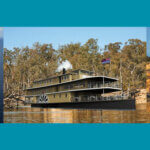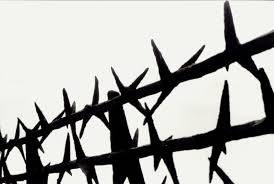 The Torrens Island Internment Camp was a World War I concentration camp, located on Torrens Island which is near Adelaide in South Australia, and is a sad facet of South Australia’s history.
The Torrens Island Internment Camp was a World War I concentration camp, located on Torrens Island which is near Adelaide in South Australia, and is a sad facet of South Australia’s history.
The camp opened on 9 October 1914 and held up to 400 men of German or Austro-Hungarian background, or crew members of enemy ships who had been caught in Australian ports at the beginning of the war. And they were held without trial under the provisions of the “War Precautions Act 1914”.
The South Australian population which included a reasonable number of German descent, saw a wave of anti-German feeling at the outbreak of the First World War. At official level, the War Precautions Act permitted sweeping powers of search, seizure of property and arrest. Lutheran churches and schools were closed and German language newspapers were banned.
In August 1914, soldiers were sent out under the authority of the Act to round up about 300 of what were called “Germans”. The internees included some German and Austro-Hungarian citizens and some Australian born, a mixture of farmers, intellectuals, and Lutheran pastors. They were only a small fraction of the people of German descent in South Australia, and with them the army had rounded up some citizens of Sweden, the Netherlands, and one from the USA – all neutral countries.
The camp was quietly closed in August 1915, after an American who was interned, wrote to the US consulate about the camp and the conditions which saw many of the internees released, while others were transferred to a more humanely-run camp at Holsworthy in New South Wales.
The official records of the Torrens Island camp were destroyed, and today virtually all that is known about the incident comes from the only wartime records that survive, principally the typescript and evidence from the Court of Enquiry.
But recently two publications have been produced telling the story of Torrens Island Internment Camp and what it was like for those in it.
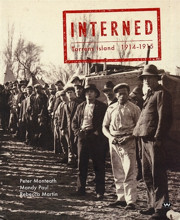 Interned: Torrens Island 1914-1915
Interned: Torrens Island 1914-1915
by Peter Monteath, Mandy Paul and Rebecca Martin
This book tells the story as observed by two internees. The story survives in the diaries of professional boxer Frank Bungardy and the compelling photographs of Paul Dubotzki. These extraordinary sources, brought together in “Interned”, tell the little-known story of South Australia’s ‘enemy within’ – a story as timely now as it has even been.
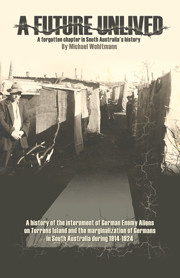 A Future Unlived: A History of the Internment of German Enemy Aliens on Torrens Island in South Australia During 1914-1924
A Future Unlived: A History of the Internment of German Enemy Aliens on Torrens Island in South Australia During 1914-1924
by Michael Wohltmann
How was it that German-Australians who were viewed as zealous, hard working and model citizens prior to the great war were five years later, treated as outcasts in their own society? “A Future Unlived” tells the compelling story of what happened to the 7000 German – Australians caught up in a war hysteria that transformed their lives, both during and after the Great War. This book investigates a forgotten period in our National and State history, and it comprehensively shows the impact of the Great War and the post War period on the German-Australian community from 1914-1924.
And for details on other concentration camps around Australia …
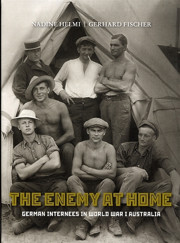 The Enemy at Home: German Internees in World War I Australia
The Enemy at Home: German Internees in World War I Australia
by Nadine Helmi & Gerhard Fischer
When nearly 7,000 people with German and Austrian heritage were detained by the Australian authorities following the outbreak of World War I, Paul Dubotzki, a talented Bavarian photographer, was among them. These unlikely prisoners-of-war came from all walks of life merchant sailors, visiting academics and many, including beer baron Edmund Resch and acclaimed orthopaedic surgeon Dr Max Herz, had lived in Australia for decades. In The Enemy at Home Dubotzki’s rediscovered photographs and never-before-published excerpts from inmates diaries reveal what life was like inside the Holsworthy, Berrima and Trial Bay internment camps. Dubotzkis stunning images offer a rare and surprising snapshot of the theatrical events, small businesses and sports that boosted the mens spirits.






